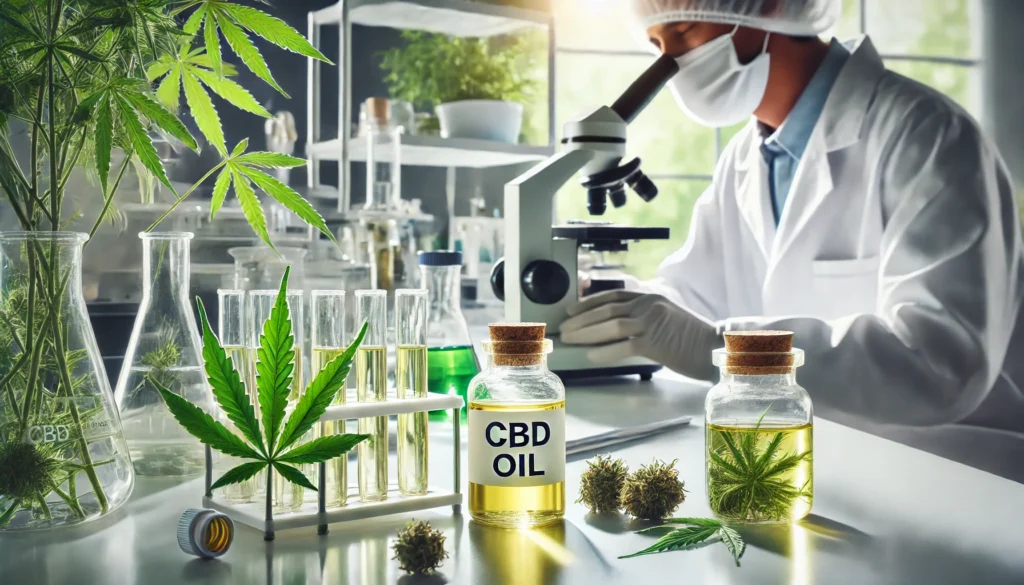Mental health conditions such as anxiety and depression are increasingly common in today’s fast-paced, stress-saturated world. As people search for safe, effective, and natural alternatives to traditional medications, cannabidiol (CBD) has emerged as a popular option. Extracted from the cannabis plant, CBD is non-psychoactive, meaning it does not produce the euphoric high associated with tetrahydrocannabinol (THC), another cannabinoid. Yet its impact on mental well-being has captured the attention of both the public and scientific communities. From CBD oil for anxiety to cannabidiol-infused gummies marketed for mood support, CBD is being touted as a possible remedy for emotional and psychological distress. But can CBD really help with anxiety and depression, and if so, how?
You may also like: Proven Relaxation Techniques for Stress and Anxiety: Evidence-Based Strategies to Calm Your Mind and Body
This article explores what the latest research reveals about CBD for depression and anxiety, unpacks the science behind how CBD interacts with the brain, and provides practical insights into dosage, safety, and product selection. It will also examine the nuanced differences between treating anxiety versus depression with CBD, the role of the endocannabinoid system, and the current limitations in scientific understanding. Whether you’re seeking answers for yourself or a loved one, this comprehensive review aims to illuminate CBD’s potential role in mental health with both curiosity and caution.
Understanding Anxiety and Depression: More Than Just Mood Disorders
Before evaluating whether CBD can help anxiety or depression, it’s essential to understand what these conditions actually entail. Anxiety and depression are not just fleeting emotions or signs of weakness; they are complex mental health disorders that can profoundly affect daily functioning, cognitive processes, and overall quality of life. Generalized anxiety disorder (GAD), social anxiety, panic disorder, and specific phobias fall under the broader umbrella of anxiety disorders, each characterized by excessive worry, fear, or unease. Depression, on the other hand, often presents as persistent sadness, hopelessness, loss of interest in activities, fatigue, and even physical symptoms like aches, changes in appetite, and sleep disturbances.
While anxiety often involves heightened alertness and a sense of impending doom, depression is marked by emotional flatness and diminished motivation. Both conditions can coexist, with many individuals experiencing symptoms of both simultaneously. The underlying mechanisms of anxiety and depression involve a complex interplay of neurotransmitters such as serotonin, dopamine, and gamma-aminobutyric acid (GABA), as well as structural and functional brain changes. Traditional treatments include selective serotonin reuptake inhibitors (SSRIs), serotonin-norepinephrine reuptake inhibitors (SNRIs), benzodiazepines, and cognitive behavioral therapy (CBT). However, these approaches are not always effective for everyone and often come with significant side effects or risk of dependence. In this context, exploring alternatives like cannabidiol for anxiety and depression becomes particularly relevant.
What Is CBD? A Non-Psychoactive Compound with Psychoactive Potential
Cannabidiol is one of over 100 cannabinoids found in the cannabis plant, and it is the second most prevalent after THC. Unlike THC, CBD is non-intoxicating, meaning it does not produce a high. This quality makes it especially appealing to those seeking therapeutic benefits without altering their mental state. CBD is typically extracted from hemp, a cannabis variety with low THC levels, and formulated into oils, tinctures, capsules, edibles, and topical creams. CBD oil for anxiety is among the most commonly marketed applications, alongside products claiming benefits for pain, inflammation, sleep, and even epilepsy.
From a pharmacological perspective, CBD is a pleiotropic compound, which means it acts on multiple physiological pathways simultaneously. It affects various receptor systems in the brain and body, including serotonin receptors (5-HT1A), vanilloid receptors (TRPV1), and cannabinoid receptors (CB1 and CB2), although it does not bind directly to these receptors in the same way THC does. Instead, CBD modulates the activity of these systems indirectly, influencing neurotransmitter release, neural excitability, and inflammatory responses. These multi-target interactions may explain why CBD shows promise in managing a broad range of symptoms, including those associated with anxiety and depression.
The Science Behind CBD and Anxiety: Modulating the Stress Response
Scientific interest in cannabidiol for anxiety has surged in the past decade, driven by preclinical studies, small clinical trials, and an abundance of anecdotal evidence. A landmark 2011 study published in Neuropsychopharmacology found that CBD significantly reduced anxiety in people with social anxiety disorder (SAD) during a simulated public speaking task. Participants who received a 600 mg dose of CBD reported reduced anxiety, cognitive impairment, and discomfort compared to those who received a placebo.
CBD appears to influence the brain’s fear and stress circuits, particularly through its interaction with the 5-HT1A receptor, a subtype of serotonin receptor involved in mood regulation and anxiety. This receptor is also a target of many traditional antidepressants, which suggests overlapping mechanisms. Additionally, CBD modulates the hypothalamic-pituitary-adrenal (HPA) axis, a central player in the stress response system. By dampening HPA axis hyperactivity, CBD may reduce the physiological and psychological manifestations of stress and anxiety.
Animal studies have further supported these findings. Rodent models of generalized anxiety and post-traumatic stress disorder (PTSD) have shown reduced anxious behaviors following administration of CBD. These behavioral changes are often accompanied by neurochemical alterations in regions like the amygdala and prefrontal cortex, which are crucial for fear processing and emotional regulation. While more extensive human trials are needed to confirm these effects, the available evidence indicates that CBD for anxiety may offer a viable alternative or adjunct to conventional treatments, especially for individuals who experience adverse reactions to medications like benzodiazepines.
CBD for Depression: Enhancing Mood Through Neurochemical and Anti-Inflammatory Pathways
Although the majority of research has focused on CBD for anxiety, an increasing number of studies are exploring CBD for depression as well. Depression is associated with decreased levels of monoamine neurotransmitters, particularly serotonin and dopamine, as well as heightened neuroinflammation and impaired neuroplasticity. CBD may counteract these abnormalities through multiple mechanisms.
Firstly, by interacting with the serotonin system, CBD can potentially enhance serotonergic signaling, much like conventional antidepressants. This effect may not be as direct or potent as that of SSRIs, but it could offer a more balanced and side-effect-free alternative. Secondly, CBD exerts powerful anti-inflammatory effects. Chronic inflammation has been implicated in the pathophysiology of depression, and reducing pro-inflammatory cytokines may alleviate mood disturbances. Studies have shown that CBD decreases levels of interleukin-6 (IL-6) and tumor necrosis factor-alpha (TNF-α), two inflammatory markers elevated in individuals with major depressive disorder.
Additionally, CBD promotes neurogenesis in the hippocampus, a brain region often atrophied in depressed individuals. By stimulating the growth of new neurons and supporting synaptic plasticity, CBD may restore functional brain connectivity and improve mood. Preclinical studies in mice have demonstrated antidepressant-like effects of CBD, particularly when administered chronically. However, these findings have yet to be robustly replicated in large-scale human trials. Nonetheless, the current data suggests that CBD for depression and anxiety could serve as a multifaceted therapeutic agent targeting both emotional and physiological contributors to mental illness.

CBD Oil for Anxiety: Practical Use, Dosing, and Product Selection
With the growing popularity of CBD, a vast array of products is now available, ranging from full-spectrum tinctures to isolate-based capsules. Among these, CBD oil for anxiety has gained the most traction, largely due to its ease of use and rapid absorption when taken sublingually. However, choosing the right product and dosage requires careful consideration. Unlike pharmaceuticals, CBD is not uniformly regulated, which means product quality, potency, and labeling can vary widely. Consumers should look for third-party lab testing, certificates of analysis, and transparent ingredient lists to ensure they are purchasing a safe and effective product.
When it comes to dosage, there is no one-size-fits-all approach. Studies have used doses ranging from 25 mg to 600 mg per day, depending on the severity of symptoms and individual differences in metabolism. Beginners are generally advised to start with a low dose and gradually increase until the desired effect is achieved. It’s also important to consider the type of CBD being used. Full-spectrum products contain a range of cannabinoids and terpenes, which may enhance the effects of CBD through the “entourage effect,” while broad-spectrum and isolate products are THC-free but may lack some synergistic benefits.
Timing and consistency are also crucial. Some individuals find that taking CBD oil in the morning helps manage daytime anxiety, while others prefer evening use for improved sleep. Regardless of timing, consistent use over several weeks may be necessary to experience the full benefits, particularly when using cannabidiol for anxiety or depression. Consulting with a healthcare provider knowledgeable about CBD is recommended, especially for individuals taking other medications.
Can CBD Help Anxiety and Depression Simultaneously? Exploring Dual Benefits
Given the frequent co-occurrence of anxiety and depression, many people wonder if CBD can help with both conditions simultaneously. Encouragingly, current research suggests that it might. CBD’s multi-target action enables it to modulate various brain systems involved in mood, arousal, and emotional regulation. By enhancing serotonin signaling, reducing neuroinflammation, and promoting neuroplasticity, CBD offers a holistic approach that may address overlapping symptoms such as sleep disturbances, low motivation, and emotional dysregulation.
Furthermore, anxiety and depression often form a cyclical relationship, where one condition exacerbates the other. For instance, chronic anxiety can lead to depressive symptoms over time due to sustained stress and emotional exhaustion. Conversely, depression can make individuals more prone to anxious rumination and fear. By alleviating both anxiety and depressive symptoms, CBD may help break this vicious cycle and foster long-term emotional resilience. While more longitudinal studies are needed, the existing literature and anecdotal reports support the potential of cannabidiol for anxiety and depression in tandem.
Mechanisms of Action: The Endocannabinoid System and Beyond
A central player in CBD’s therapeutic potential is the endocannabinoid system (ECS), a complex cell-signaling network that helps regulate mood, stress, pain, appetite, and sleep. The ECS comprises endogenous cannabinoids (such as anandamide), cannabinoid receptors (CB1 and CB2), and enzymes that synthesize and degrade these molecules. Although CBD does not directly bind to CB1 or CB2 receptors, it influences the ECS by inhibiting the enzyme fatty acid amide hydrolase (FAAH), which breaks down anandamide. By increasing anandamide levels, CBD may enhance mood and reduce anxiety.
Beyond the ECS, CBD interacts with other receptor systems. It modulates GABAergic signaling, which is critical for calming the nervous system, and activates TRPV1 receptors involved in pain and stress responses. It also influences dopamine and glutamate levels, further impacting reward processing and emotional regulation. These multifaceted interactions underscore why CBD is being studied for a wide range of mental health conditions, from generalized anxiety disorder to major depressive disorder and even schizophrenia.
Understanding these mechanisms not only validates the use of CBD for anxiety and depression but also opens the door for future pharmacological innovations. Researchers are now investigating synthetic cannabinoids, novel delivery systems, and combinatory therapies that may enhance or refine the benefits of cannabidiol. While CBD is not a panacea, its diverse pharmacological profile offers a promising foundation for integrative mental health care.
CBD and Mental Wellness: A Promising but Evolving Frontier
As our understanding of the human brain deepens, so too does our appreciation for the complexity of treating mental health conditions like anxiety and depression. CBD has emerged as a compelling candidate in the broader conversation about emotional wellness, offering a unique blend of neurochemical, anti-inflammatory, and anxiolytic properties. While the science is still evolving, current evidence points to real potential for cannabidiol to provide meaningful relief, especially for those who have not found success with traditional therapies or who seek a more natural alternative.
Research into CBD for depression and anxiety is still in its early stages, but the results so far are promising. Many individuals report improvements in mood, reduced anxious thoughts, and better sleep when using CBD consistently. However, it is crucial to emphasize that CBD is not a miracle cure. It works best as part of a comprehensive mental health strategy that may include therapy, exercise, mindfulness, and, in some cases, medication. Moreover, the long-term safety and efficacy of CBD use for mental health are still under investigation, making it vital for users to remain informed and cautious.

Frequently Asked Questions: CBD for Anxiety and Depression
1. Can CBD help anxiety symptoms that are triggered by specific social situations?
Yes, CBD has shown potential in easing situational anxiety, especially in socially charged scenarios such as public speaking or crowded events. While many users turn to CBD for anxiety relief in generalized cases, studies suggest that its calming effects on the amygdala and prefrontal cortex may specifically reduce reactivity to social stressors. For instance, individuals with social anxiety disorder have reported fewer physiological signs of stress, such as increased heart rate and sweating, after using CBD. Using CBD oil for anxiety before anticipated events may help users maintain a sense of composure and reduce avoidant behavior. However, finding the optimal timing and dosage is key to maximizing benefits in these episodic situations.
2. How does cannabidiol for anxiety differ in its effect from traditional anti-anxiety medications?
Unlike conventional anxiolytics such as benzodiazepines or SSRIs, cannabidiol for anxiety works through indirect modulation of the endocannabinoid system, serotonin receptors, and GABA pathways without inducing sedation or dependence. Traditional drugs often come with risks like tolerance buildup or withdrawal, whereas CBD appears to have a more favorable safety profile. CBD’s broader physiological interactions may provide emotional regulation without blunting cognition or alertness. Additionally, users interested in CBD for depression and anxiety frequently report improved sleep quality and reduced rumination, which are not always addressed by pharmaceuticals. Still, it’s important to remember that clinical trials comparing CBD head-to-head with medications are limited, so consultation with a provider is strongly recommended.
3. Is CBD good for anxiety-related insomnia, and how does it affect sleep architecture?
CBD may be particularly useful for those whose anxiety manifests in disrupted sleep patterns, including difficulty falling or staying asleep. Early research indicates that CBD enhances REM sleep latency and may reduce the number of nighttime awakenings, which is beneficial for anxiety-induced insomnia. Unlike melatonin, which directly regulates circadian rhythms, CBD interacts with anxiety-related neurotransmitter systems that influence sleep indirectly. Using CBD oil for anxiety-related insomnia may also reduce nocturnal hyperarousal and racing thoughts. For some users, consistent bedtime use of CBD not only improves sleep quality but also reduces the anxious anticipation of not being able to rest.
4. Does CBD help with anxiety in high-stress professions like healthcare or finance?
Professionals in high-stakes environments often experience chronic stress and performance pressure, which can escalate into persistent anxiety. Anecdotal reports and pilot studies suggest that CBD for anxiety may help such individuals manage physiological symptoms like restlessness, irritability, and heightened alertness. Its non-intoxicating nature allows users to remain clear-headed while enhancing emotional resilience under pressure. For example, nurses working long shifts or financial analysts navigating volatile markets may benefit from CBD’s ability to stabilize mood without impairing executive function. While more occupational-specific trials are needed, many users in demanding fields report that CBD helps them return to a calm baseline more efficiently.
5. How does CBD interact with mindfulness and therapy in treating anxiety and depression?
Integrating CBD with mindfulness-based interventions and therapy can offer a synergistic approach to managing emotional distress. When used alongside practices like cognitive behavioral therapy (CBT) or acceptance and commitment therapy (ACT), CBD may help reduce the emotional reactivity that can hinder therapeutic engagement. Some therapists report that clients using cannabidiol for anxiety are better able to tolerate distressing emotions during sessions, which improves therapeutic progress. Similarly, those using CBD for depression and anxiety often find mindfulness more accessible because they experience fewer intrusive thoughts. This mind-body alignment can enhance the therapeutic outcome by deepening self-awareness and reducing the overwhelm associated with emotional processing.
6. Will CBD help with anxiety in adolescents or young adults facing academic stress?
Emerging research is beginning to examine the use of CBD for anxiety among younger populations, particularly those experiencing school-related pressures. While long-term safety data in adolescents is limited, preliminary studies suggest that low doses of CBD may reduce test anxiety and improve focus. Parents and guardians often ask, “Can CBD help anxiety in teens without impairing development or cognition?” The current answer is cautiously optimistic, as CBD appears to avoid the psychoactive and dependency risks associated with THC or prescription sedatives. Still, professional guidance is essential to ensure appropriate dosing and to rule out interactions with other medications or mental health interventions. Education-based applications of CBD, if used judiciously, may offer supplemental relief during high-pressure academic periods.
7. Is there a difference in how men and women respond to CBD for depression and anxiety?
Gender-based responses to CBD are an emerging area of interest in cannabinoid research. Preliminary findings suggest that hormonal differences may influence how men and women metabolize CBD and respond to its anxiolytic effects. For instance, some women report improved mood stability during hormonal fluctuations, such as PMS or menopause, when using CBD for depression. Conversely, men often report more noticeable changes in physical anxiety symptoms like tension or gastrointestinal discomfort. While these observations are largely anecdotal, they point toward the need for more gender-specific research on cannabidiol for anxiety and mood disorders to optimize outcomes across populations.
8. What should consumers consider when choosing CBD oil for anxiety relief in a saturated market?
The CBD industry is booming, and not all products are created equal. For those seeking CBD oil for anxiety, it’s vital to prioritize third-party lab-tested products that list their cannabinoid profile and confirm THC levels are within legal limits. Full-spectrum options may offer enhanced effects due to the entourage effect, but those concerned about drug testing may prefer broad-spectrum or isolate forms. In choosing cannabidiol for anxiety, consumers should also consider bioavailability; tinctures absorbed sublingually generally provide faster effects than capsules or edibles. Brands that provide transparency around sourcing, extraction methods, and batch testing tend to offer more consistent and reliable results.
9. Can combining CBD with adaptogenic herbs enhance its effects for depression and anxiety?
Combining CBD for depression and anxiety with adaptogens like ashwagandha, rhodiola, or holy basil may amplify stress resilience and emotional balance. These herbs are known for their ability to modulate cortisol and support the adrenal system, making them complementary to CBD’s role in endocannabinoid modulation. While clinical data on such combinations is still limited, integrative practitioners are increasingly exploring these pairings for their potential to enhance mood and reduce fatigue. When used together, adaptogens and CBD may support a more comprehensive response to chronic stress and burnout. However, individuals should consult a healthcare provider to ensure compatibility and to prevent unwanted interactions.
10. What are the potential long-term benefits of using CBD for anxiety and depression management?
In long-term use, CBD may help regulate the underlying systems that contribute to chronic stress and emotional dysregulation. For example, its impact on neurogenesis and synaptic plasticity may support cognitive flexibility and emotional adaptability over time. While acute relief is often the initial draw, consistent use of cannabidiol for anxiety and depression may foster greater resilience to future stressors and reduce recurrence rates of mood episodes. Some users report that regular CBD use leads to decreased reliance on other medications or less frequent need for therapy sessions. As more longitudinal studies become available, the future of CBD for anxiety and depression looks increasingly promising for individuals seeking sustainable, integrative mental health strategies.

Ultimately, whether you’re wondering, “Can CBD help anxiety?” or exploring the question, “Is CBD good for anxiety and depression?” the answer lies in a growing body of scientific inquiry and personal experience. For some, CBD may serve as a transformative supplement that brings emotional balance and resilience. For others, it may simply offer subtle support alongside other therapies. Either way, staying attuned to the latest research and consulting with healthcare professionals will ensure that your approach to mental wellness is grounded in both science and self-awareness.
In the ever-expanding world of wellness solutions, cannabidiol for anxiety and depression stands out not because it promises easy answers, but because it invites deeper questions—about how we heal, how we cope, and how we care for our minds as much as our bodies. As more high-quality studies emerge and regulatory frameworks evolve, CBD may well become a trusted ally in the pursuit of mental clarity and emotional well-being.
natural remedies for mental health, holistic approaches to anxiety, hemp-derived supplements, non-psychoactive cannabinoids, plant-based anxiety relief, stress management supplements, emotional wellness support, endocannabinoid system regulation, herbal support for depression, integrative mental health, adaptogens and mood, calming natural compounds, alternative treatments for anxiety, cannabis and mood disorders, wellness strategies for stress, anxiety and sleep connection, therapeutic cannabinoids, brain inflammation and mood, mental resilience tools, herbal mood stabilizers
Further Reading:
Cannabidiol (CBD) in the Self-Treatment of Depression
Medicinal cannabis for the treatment of anxiety disorders
CBD for Depression and Anxiety: Does It Work?
Disclaimer
The information contained in this article is provided for general informational purposes only and is not intended to serve as medical, legal, or professional advice. While Health11News strives to present accurate, up-to-date, and reliable content, no warranty or guarantee, expressed or implied, is made regarding the completeness, accuracy, or adequacy of the information provided. Readers are strongly advised to seek the guidance of a qualified healthcare provider or other relevant professionals before acting on any information contained in this article. Health11News, its authors, editors, and contributors expressly disclaim any liability for any damages, losses, or consequences arising directly or indirectly from the use, interpretation, or reliance on any information presented herein. The views and opinions expressed in this article are those of the author(s) and do not necessarily reflect the official policies or positions of Health11News.


